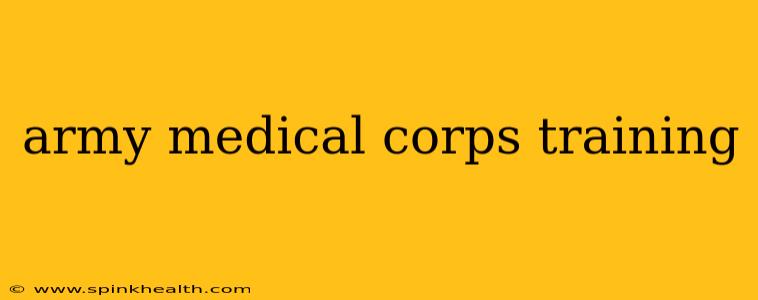The rhythmic thud of boots on pavement, the crisp scent of antiseptic, the quiet intensity of a medic tending to a simulated wound – these are just glimpses into the rigorous world of Army Medical Corps training. It’s a journey demanding physical and mental resilience, a path forged in dedication and culminating in a career devoted to saving lives, even under the most extreme circumstances. This isn't just about patching up scrapes; it's about mastering critical life-saving skills in high-pressure environments. Let's delve into the intricacies of this demanding yet rewarding training.
What is the Army Medical Corps?
The Army Medical Corps (AMC) is a vital branch of the United States Army, responsible for providing comprehensive medical and dental care to soldiers, both in peacetime and during combat. Think of them as the backbone of medical support for our armed forces, a network of highly skilled professionals who ensure the health and well-being of those who serve. From battlefield trauma care to preventative medicine, the AMC's reach is extensive, requiring diverse skill sets and rigorous training. Their work is often unseen, but it's undeniably crucial to the Army's operational readiness.
What kind of training does the Army Medical Corps require?
The training pipeline for the AMC is multifaceted, encompassing both classroom learning and hands-on experience. It’s not a one-size-fits-all approach; the specific training varies depending on the chosen medical specialty. However, there are common threads that run through all AMC training paths:
Basic Combat Training (BCT):
This is the foundational level for all Army recruits, regardless of their chosen specialty. BCT instills discipline, physical fitness, and the core values of the Army. It's a demanding physical and mental test, laying the groundwork for the rigors of advanced medical training.
Advanced Individual Training (AIT):
After BCT, aspiring AMC members enter AIT, where they specialize in their chosen medical field. This could range from Combat Medic training, where the focus is battlefield trauma care and emergency medical response, to more specialized roles like physician assistant, nurse, or medical technician. AIT is intensely practical, involving extensive simulations, realistic scenarios, and hands-on experience with medical equipment.
Specialized Training:
Depending on the chosen specialty and career progression, additional specialized training might be required. This could include advanced trauma care courses, operating room techniques, or leadership and management training for those in supervisory roles. Continuous learning and professional development are critical aspects of an AMC career.
How long is Army Medical Corps training?
The duration of AMC training varies depending on the specific role. Combat Medic training, for instance, is typically shorter than the training required for a physician assistant or nurse. Expect the total training time, including BCT and AIT, to range from several months to several years, depending on the chosen profession and additional specialized training required.
What are the educational requirements to join the Army Medical Corps?
While a college degree isn't always required for all AMC roles, it certainly enhances career prospects and opens doors to more specialized positions. For instance, aspiring physician assistants typically need a bachelor's degree, while registered nurses need an associate's or bachelor's degree in nursing. However, for roles like combat medic, a high school diploma or GED is typically sufficient, though a prior background in healthcare or related fields is highly advantageous.
What are the physical requirements to join the Army Medical Corps?
The physical requirements for the AMC are rigorous. Aspiring members must meet specific standards for physical fitness, visual acuity, and overall health. These standards ensure individuals can handle the physical demands of the job, whether it's carrying heavy medical equipment in the field or providing prolonged care under stressful conditions. Specific requirements can be found on the official Army recruitment website.
What is the job outlook for Army Medical Corps personnel?
The job outlook for AMC personnel is generally excellent. The Army continuously seeks qualified medical professionals, making career opportunities plentiful for those dedicated to serving their country. Moreover, the skills and experience gained in the AMC are highly transferable to civilian careers in healthcare, offering a broad range of future options once service is complete.
The Army Medical Corps isn’t just a career; it’s a calling. It demands dedication, resilience, and a profound commitment to serving others, even in the face of adversity. The journey through training is challenging, but the rewards—both personal and professional—are immeasurable.

